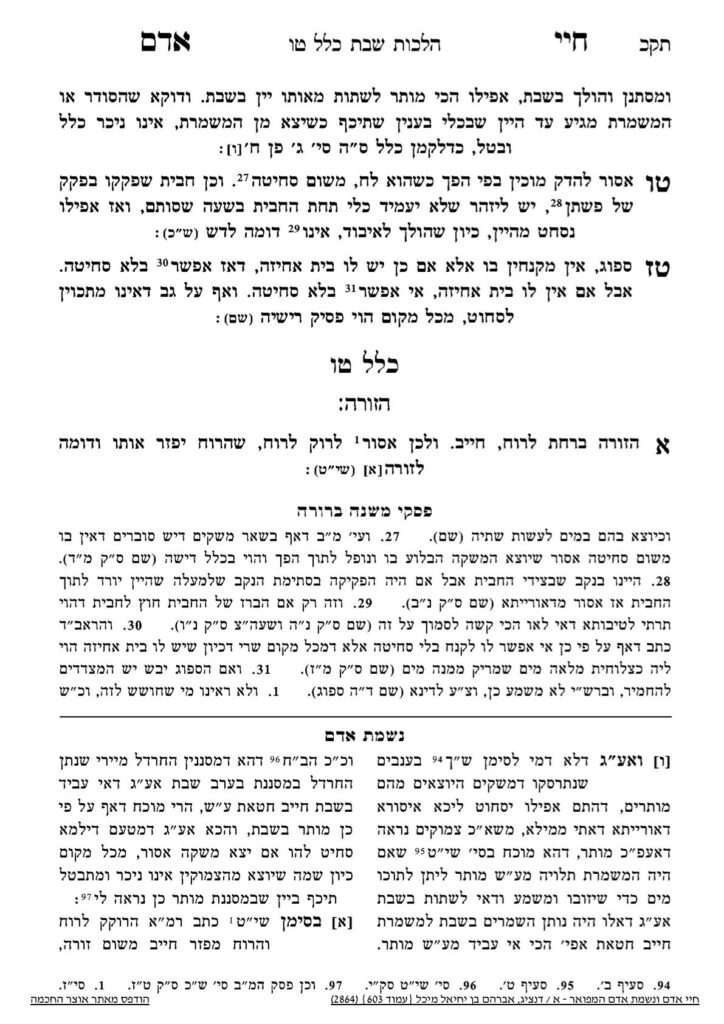We have finished siman 15, and touched on the concept of psik reisha. We touched on the difference between psik reisha d’nicha lei, (which is assur mideoraysa) and psik reisha d’lo nicha lei (which we pasken is assur miderabanan). Today, we will review this point. See shiur s274 for further discussion of this concept.
There is a machlokes throughout shas whether davar she’eino miskavein is muttar or not. Davar she’eino miskavein refers to where a person performs a muttar action, and a second, assur action occurs as well. This machlokes is not limited to Shabbos; for example, the Gemara discusses it regarding extinguishing the fire on the mizbeach, kilayim, and from avodah zarah, among other scenarios. In all of these cases, Rav Shimon holds that davar she’eino miskavein is muttar, and Rav Yehuda holds it is assur. Rav Yehuda holds that since it is possible that an issur deoraysa will take place, the action is assur, because of the concept that safeik deoraysa lechumra. Rav Shimon holds it is muttar because he holds that the issurim in the Torah are not inherently assur because of the occurance of the issur, but because of their performance by a human. When an action happens unintentionally, it is lacking the human content and it is not assur.
The Gemara continues, and says that Abaye and Rava add that even Rav Shimon agrees in a case of psik reisha v’lo yamus, which literally means can one chop off its head and it will not die? In other words, when the outcome is inevitable, Rav Shimon agrees it is assur. One explanation is that the intent for the heter action and the issur action merge because of the inevitability. Alternatively, since it is inevitable, the person is aware it will happen, so it is as if they are performing the action deliberately.
The Aruch, written by a rishon named Rav Nosson( prior to Rashi) is a lexicon of words throughout shas. In defining a word, he will often explain the Gemara from which the word orignates. The Aruch writes that although psik reisha is assur, if it is a psik reisha d’lo nicha lei, it is muttar. Meaning, if the person does not want the outcome, or does not care about the outcome (we do not differentiate in halacha), the action is muttar. Tosfos disagrees, and holds that psik reisha d’lo nicha lei is assur. In other words, even though the person has no interest in the second action, it is still assur miderabanan.
Getting back to our discussion yesterday (s406), if a person tries to stuff a cloth into a barrel, thereby causing the cloth to both absorb and squeeze out liquid from the barrel, it is a psik reisha that the cloth will get squeezed, so it is a psik reisha d’nicha lei. To be clear, nicha lei does not have to mean that the person has a strong positive interest in the outcome, but as long as the person has some positive benefit from the outcome, it is considered nicha lei. If the liquid squeezed will fall onto the floor, it is no longer nicha lei for the liquid to be squeezed, so it becomes a psik reisha d’lo nicha lei. So, according to the Aruch, when the liquid is lost, it is muttar.
Although Tosfos holds that psik reisha d’lo nicha lei is still assur miderabanan, Tosfos says that this case will be better than usual. Because the entire concept of schita is learned from dosh, schita will only be assur if it approximates dosh. Dosh is defined as extracting the kernel for use of the kernel, so schita will only be assur when the liquid is extracted and usable. If the liquid is discarded, it no longer approximates dosh and will be muttar even according to Tosfos.
Summary
- One may place, remove or replace a cloth in a barrel, even though the cloth will inevitably become saturated and one will end up squeezing the liquid out of the cloth, provided that the liquid which is squeezed will be discarded. It does not approximate dosh so there is no issur.
- If the liquid is not discarded, either because one tries to save it with another utensil, or because the liquid returns back into the barrel, it will be assur mideoraysa, because it is a psik reisha d’nicha lei.



